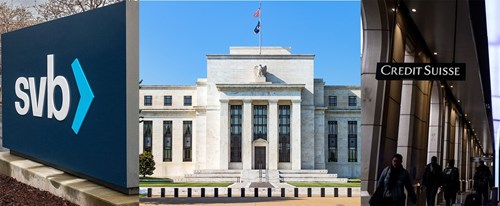
This week’s update is written by Jon Pope in our cash management team.
We are once again in a worrying place for financial markets. The failure of the 16th largest bank in America and the turmoil at Credit Suisse, which has resulted in the merger with UBS, has obviously caused significant concerns. The problems at Credit Suisse have been ongoing for a number of years and the merger with UBS has long been seen as the best option to restore some confidence. It is still very early days, but market reaction has at least been muted.
The specific problem that led to the collapse of the Silicon Valley Bank (SVB) was their need to sell fixed-income securities to fund deposit withdrawals. However, because official interest rates had risen so quickly, the bonds had to be sold at a loss. The announcement by the Federal Reserve (Fed) of a new scheme – The Bank Term Funding Program (BTFP) – was designed to help other banks in a similar position. The BTFP will allow any bank to borrow from the Fed for up to a year using bonds they already hold as collateral. The key point of the scheme is that the Fed will lend against the par value of the bonds rather than their market value. Commentary from Goldman Sachs neatly sums up the importance of this difference:
“This will allow banks to fund potential deposit outflows without crystalizing losses on depreciated securities.”
However, one of the reasons for the failure was the speed and the size of interest rate rises authorised by the Fed. This puts the Fed in a very difficult position at their next meeting later this week, on 22nd March. Inflation in the US is still a lot higher than the Fed would like, which agitates for them to raise interest rates. However, by doing so they run the risk of putting further pressure on the financial system.

Turning to the UK, we think that whilst the Monetary Policy Committee (MPC) have raised interest rates over the last few months, their tone has changed. UK markets went through their own period of turmoil last year, caused by higher interest rates with the issues in the longer dated gilt market, and the MPC does appear to have taken note.
In a speech by Bank of England Governor Andrew Bailey on 1st March he reminded everyone that at the last MPC meeting in February, “...we made a very deliberate change to the way we described our view of the outlook. We moved away from what had effectively been a presumption at our previous meetings that further increases in base rate would be required.”
Whilst the committee said that further tightening would be required if there was evidence of more persistent inflationary pressure than anticipated in the February forecast, Mr Bailey stated that his reading of the evidence since then was that "the economy is evolving much as we expected it to”, with slight upside surprises on activity and wages being countered by a slight downside surprise on CPI inflation.
Mr. Bailey concluded that he “…would caution against suggesting either that we are done with increasing base rate, or that we will inevitably need to do more. Some further increase in base rate may turn out to be appropriate, but nothing is decided.” It is clear from Mr. Bailey’s speech that the committee is placing emphasis on the substantial tightening already delivered with the prospect of calling time on its hiking cycle.
Given the current uncertainty, some commentators are starting to predict that central banks will start to cut rates to support the financial system. In our opinion interest rate cuts will only be a benefit to markets if they are made because inflation is falling, and central banks judge they can moderate interest rates safely. If the decision is made to cut interest rates because of further financial turmoil, then this would suggest that conditions have deteriorated and in that sort of environment market sentiment will still be negative.
Whilst the current situation is still uncertain, we remain comfortable with our counterparty selection and believe that the authorities have the upper hand. The most likely outcome at the moment, we believe, is that this issue does not become systemic but that it does cap the ability of central banks to raise interest rates much higher.
We hope you have a good week.

